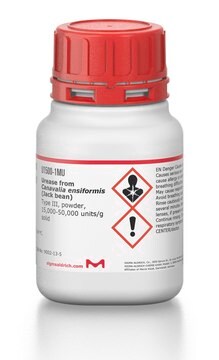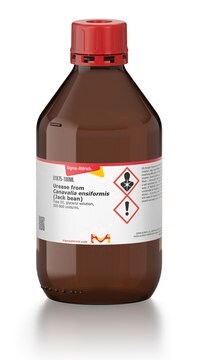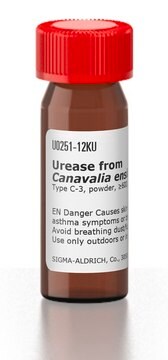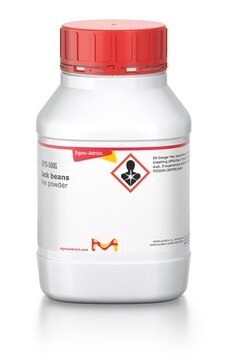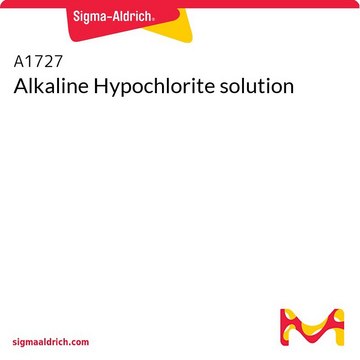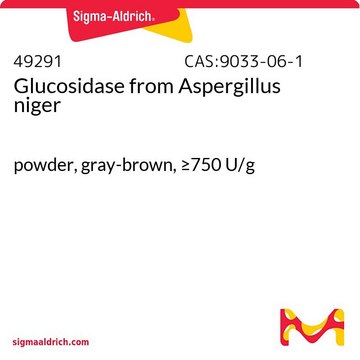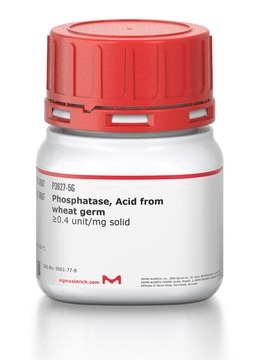U3383
Urease Buffer Reagent
Sinonimo/i:
Urea colorimetric determination assay reagent
Autenticatiper visualizzare i prezzi riservati alla tua organizzazione & contrattuali
About This Item
Codice UNSPSC:
12352204
NACRES:
NA.54
Prodotti consigliati
Descrizione
When reconstituted, product is a solution of urease from Jack bean in 27 mM EDTA with 0.1% sodium azide as a preservative.
Livello qualitativo
Stato
powder
PM
545 kDa
Temperatura di conservazione
2-8°C
Descrizione generale
Urease is a 545 kDa protein critical for the hydrolysis of urea to carbon dioxide and ammonia.
Urease is a dinickel enzyme that hydrolyses urea into ammonia and carbon dioxide. It is secreted by several bacterial species, invertebrates, fungi, and plants. Detection of urease activity is a potential diagnostic tool for Helicobacter pylori infections and several oral bacterial infections. two Ni2+ ions bridged by a hydroxyl group and a carbamylated lysine.
Applicazioni
Urease Buffer Reagent has been used:
- to measure plasma urea N (PUN) by the hypochlorite-phenol nitroprusside method
- in cell viability assay to measure the synthesis of urea in human fetal stem/progenitor cells
- to study the metabolic capacity of rat hepatocytes
Used in conjunction with Phenol Nitroprusside solution (Product Code P 6994) and Alkaline Hydpochlorite solution (Product Code A 1727) for the colorimetric determination of urea.
Avvertenze
Danger
Indicazioni di pericolo
Consigli di prudenza
Classi di pericolo
Eye Irrit. 2 - Resp. Sens. 1 - Skin Irrit. 2
Codice della classe di stoccaggio
13 - Non Combustible Solids
Classe di pericolosità dell'acqua (WGK)
WGK 1
Punto d’infiammabilità (°F)
Not applicable
Punto d’infiammabilità (°C)
Not applicable
Dispositivi di protezione individuale
Eyeshields, Faceshields, Gloves, type ABEK (EN14387) respirator filter
Scegli una delle versioni più recenti:
Possiedi già questo prodotto?
I documenti relativi ai prodotti acquistati recentemente sono disponibili nell’Archivio dei documenti.
I clienti hanno visto anche
Cristian Follmer
Phytochemistry, 69(1), 18-28 (2007-08-21)
The broad distribution of ureases in leguminous seeds, as well as the accumulation pattern of the protein during seed maturation, are suggestive of an important physiological role for this enzyme. Since the isolation and characterization of jack bean urease by
Kang Cheng et al.
Hepatology (Baltimore, Md.), 50(4), 1194-1203 (2009-07-29)
Tracking stem/progenitor cells through noninvasive imaging is a helpful means of assessing the targeting of transplanted cells to specific organs. We performed in vitro and in vivo studies wherein adult human hepatocytes and human fetal liver stem/progenitor cells were labeled
Yuta Enami et al.
Hepatology (Baltimore, Md.), 55(4), 1182-1192 (2011-10-14)
Organs from non-heart-beating donors are attractive for use in cell therapy. Understanding the nature of molecular perturbations following reperfusion/reoxygenation will be highly significant for non-heart-beating donor cells. We studied non-heart-beating donor rats for global gene expression with Affymetrix microarrays, hepatic
L A Winkelman et al.
Journal of dairy science, 96(12), 7565-7577 (2013-10-15)
This study investigated the effect of 2 different types of long-acting insulin on milk production, milk composition, and metabolism in lactating dairy cows. Multiparous cows (n=30) averaging 88 d in milk were assigned to one of 3 treatments in a
Rukhsana Aslam et al.
Histology and histopathology, 35(12), 1483-1492 (2020-10-31)
To determine the role of the transplantation of bone marrow-derived mesenchymal stem cells (MSCs) in podocyte renewal, we studied BALB/C mice with or without adriamycin-induced acute kidney injury. MSCs were transplanted ectopically under the capsule of the left kidney or
Il team dei nostri ricercatori vanta grande esperienza in tutte le aree della ricerca quali Life Science, scienza dei materiali, sintesi chimica, cromatografia, discipline analitiche, ecc..
Contatta l'Assistenza Tecnica.